|
Getting your Trinity Audio player ready...
|
Every fifteen days, since January 2016, economist and professor Juan Triana Cordoví has a date with OnCuba readers. Eight years after he began publishing his column Contrapesos, the sum of his articles has become a broad window to study the recent economic history of Cuba in these difficult years.
I have a lot of admiration for his persistence as a columnist and I am glad to have invited him to have that space. You can agree, or not, with each of the corners and approaches of his analysis but, without a doubt, Triana has helped us multiply an economic culture that we so need; and he has shed light on many interstices of the very little and sanctimonious economic information handled by politicians and the media in Cuba.
The year 2023 ends with the announcement of a decrease in the economy of between 1 and 2%. Terrible news. The facts of macroeconomics continue to be projected mercilessly on the table of Cubans: the shortage of consumer goods and services, the persistent devaluation of the Cuban peso and unbearable prices for most pockets, are some of the symptoms that have the most impact on daily life in Cuba.
Beneath these reflections, an extensive tangle of distortions, imbalances, obsolete or absurd regulations, inconsistencies in the application of some policies, emerging corruption, indecisions…. Everything is so complex that sometimes one wonders if what is needed is magic to right these wrongs. But magic is pure illusion, we already know this.
To close this year we invited Triana to chat by video call for just over an hour, which turned out to be a very short time. At least he was able to make a quick assessment of 2023 and offer some projections for the year that is just about to begin.
Although he declares himself an optimist “because of genetics,” when I asked him to describe 2024 in a single word he told me, without hesitation: “really tough.”
What happened to the prioritized objectives of 2023?
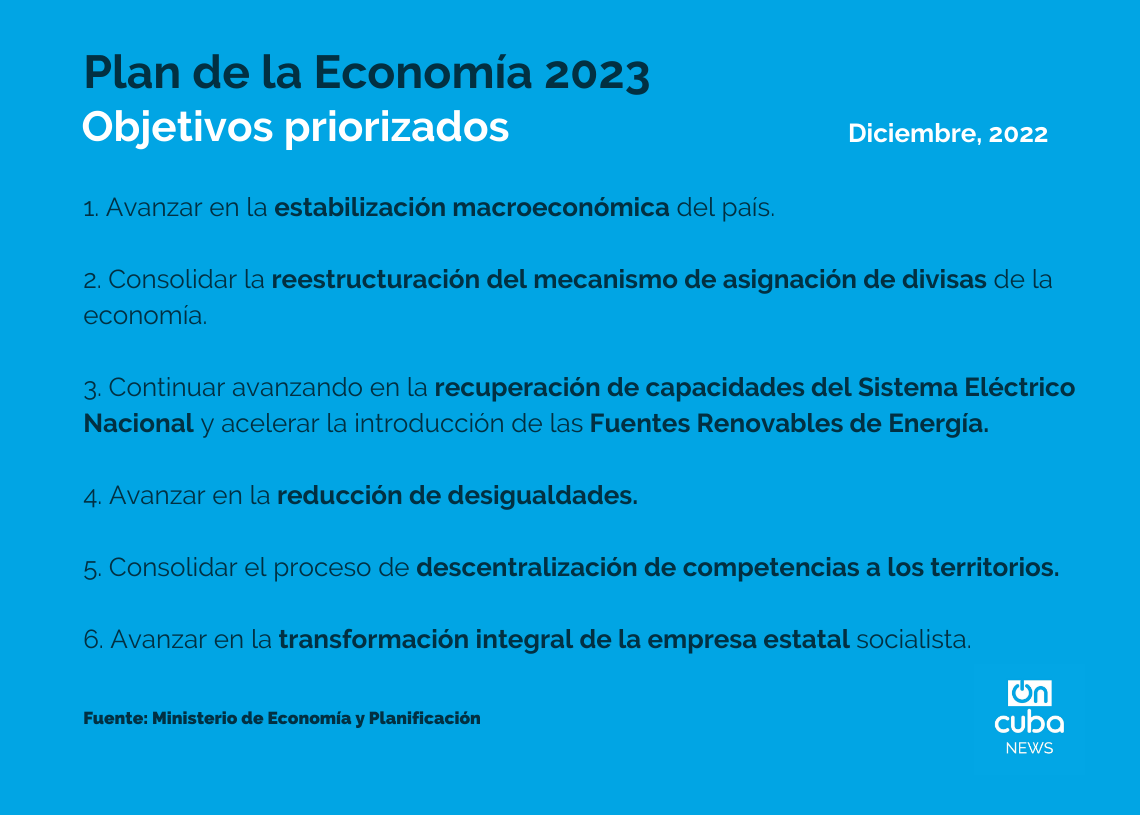
The first thing we need to do is contextualize 2023 and how those objectives were envisioned and how the year evolved. Meeting these objectives was a great challenge for the country, for the country’s economy, for the government. And I think that there was a group of elements that logically did not contribute.
I would always have to say that one of those first major obstacles continues to be the United States blockade on Cuba. That is indisputable. We all suffer from it. We.…
Not only the state enterprises, not only the enterprises in the budgeted sector of the Cuban economy, but we all suffer from it. The population suffers from it; the non-state sector suffers from it, which also sometimes finds it very difficult to carry out an operation in Cuba with resources for Cuba: the operations become more expensive, the intention of doing something in Cuba is often diluted. So, taking stock, I would tell you that the first of those objectives, which emerged as a very important objective, to advance macroeconomic stabilization, the Cuban authorities themselves, both the minister of economy, the president, and the prime minister, recognized that it was not met. That was a phenomenon that, from the first months, was known that it was going to be very difficult to achieve, which is why it implies a macroeconomic stabilization program.
The second, the consolidation of the restructuring of the economy’s currency allocation mechanism, was also not fulfilled. It has been recognized. Today Cuba continues to suffer a serious problem with the issue of foreign currency allocation.
It is even among this year’s objectives, and among the ideas that the prime minister raised: trying to consolidate a mechanism that allows a much more appropriate allocation of foreign currency and consistent with the aspiration of the economy growing. That has not been achieved.
And I think that the third of those objectives, which is to continue advancing in the recovery of the national power system’s capacity, was achieved. Generation increased and, despite the fact that we continue to suffer a deficit, we continue to have a power system in a very critical and sensitive situation, among other things, due to maintenance problems, lack of parts, old age of the plants…. At least capacities were recovered. I would say, well, it’s not the best way we could have recovered them, because it would have been preferable to recover them with renewable energy, but it is not possible.
Furthermore, it is very clear that making investments in renewable energy also requires time, it also requires businesses where that investment can be recovered.
It is also part of the objectives that appear. And the tasks that appear for this year, because they were definitely not completely accomplished.
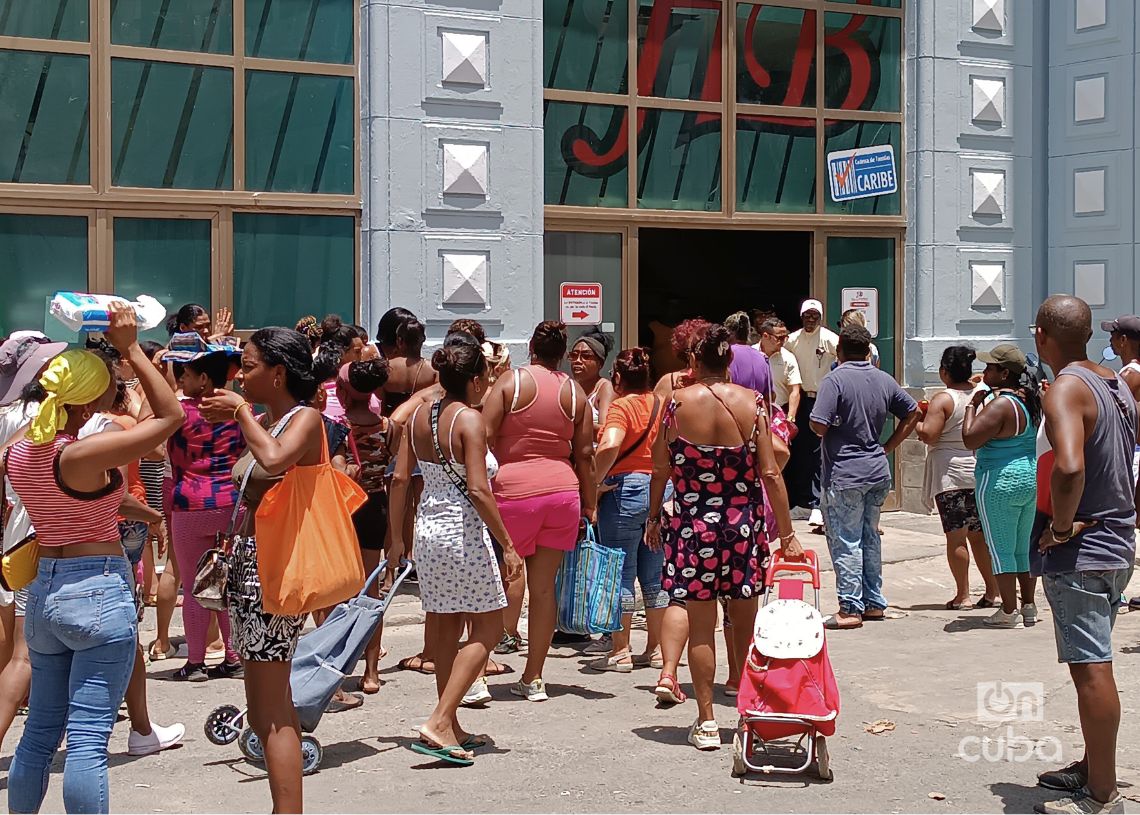
An immense effort was made to advance in the reduction of inequalities, focusing on some programs, but it would have to be said that in 2023, at least from my perception, I have data that can prove it, it was not possible to reduce inequalities, but rather the contrary. In several sectors these inequalities increased.
It fundamentally has to do with this phenomenon of monetary distortions, this systematic devaluation of the Cuban peso and the loss of families’ purchasing power.
Progress was made, without a doubt, in the decentralization process. There are competences in the territories, but much remains to be done. One of the most important problems with the decentralization of competences to the territories has to do with the capacity of the territories to efficiently assimilate this decentralization and assume these new competences and be able to do it efficiently.
There remains a very large space to advance, without a doubt. Having focused the territories is an important element in this.
This process of Cuba’s transformation is truly decisive, but I want to clarify that the sum of the parts is never the whole. And I want to say this because a lot of emphasis has been placed on the decentralization of competences in the territories, but it is very important to maintain, however, that line of national purposes to which we must all contribute, including the territories.
There is an issue there, without a doubt, that is a great challenge, which is that issue of coordination between the purposes and needs of the territories and the purposes and needs at the level and scale of the entire nation.
And logically, I reiterate, they have the challenge of finding people with sufficient skill to be able to take on that task.
The prime minister pointed out the mobility that exists in the territories’ cadres and it is one of the biggest challenges at that level.
The other thing is to advance in the comprehensive transformation of the state enterprise. It remains a pending account, unfortunately. The Enterprise Law was not discussed either in this National Assembly session. That discussion has been postponed again. It seems that specific aspects of the law are not yet fully agreed upon. I think it is something that should not delay. Our state enterprise really needs a law that summarizes what an enterprise should be and how a state enterprise should be led in the conditions of a socialist regime, which is very different from how a public enterprise can be managed in a capitalist regime. An enterprise law that gives the powers that enterprises and their entrepreneurs necessarily have to have is fundamental for the country.
I always say that it seems that business autonomy is like the horizon, that we move towards it, but we never manage to reach it. It constantly moves away from us. The state enterprise is ultimately the heart of this economy because it is responsible for 97% of sales, ensures more than 85% of GDP, and carries out more than 80% of exports.
The idea is that this enterprise be dynamic enough and can become that small engine that drives the rest of the economy and all other forms of management that are non-state.
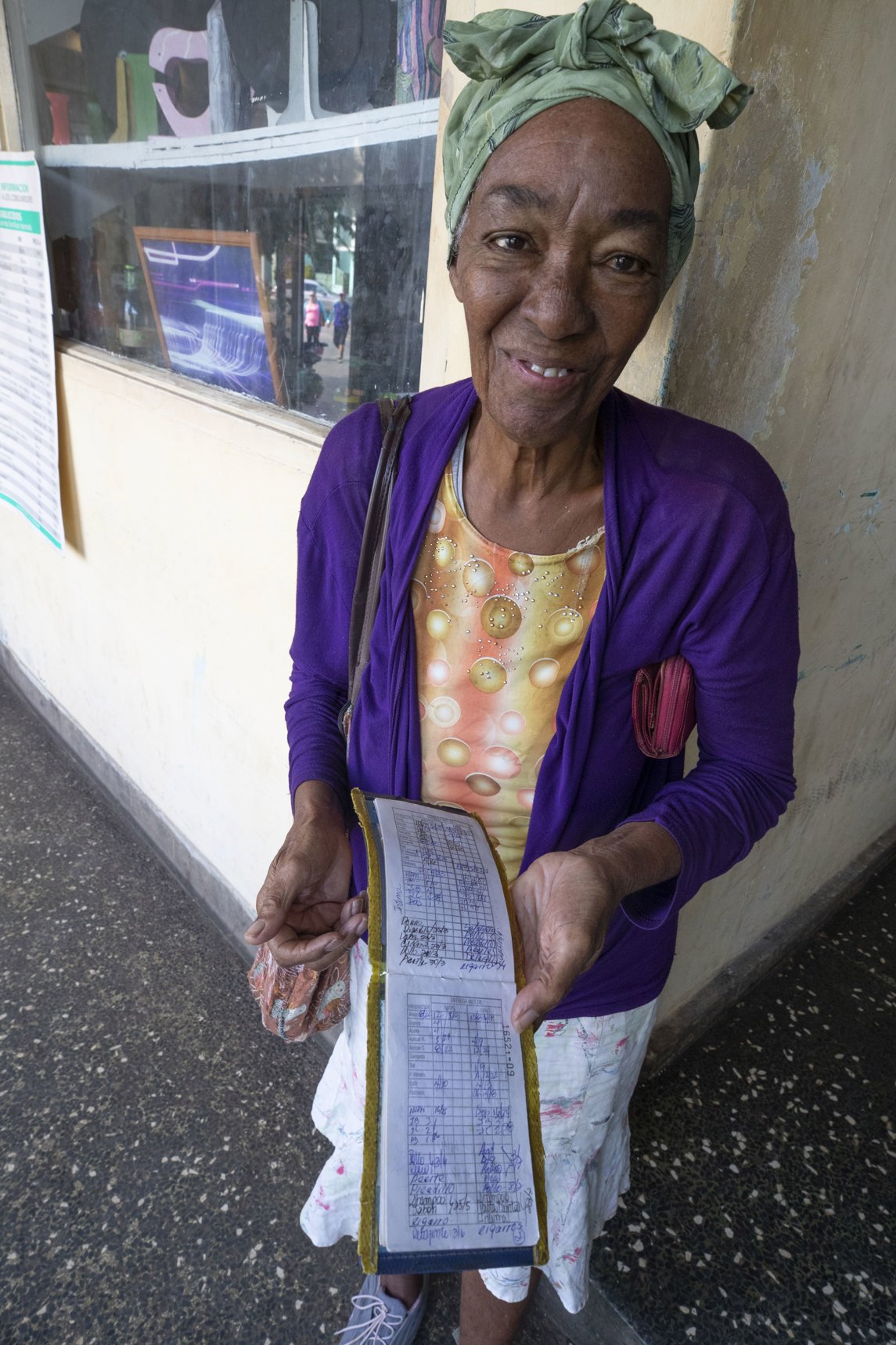
The decrease of the economy, what does it mean?
Decrease in the economy means that economic activity is reduced. In the case of the economy, growing and decreasing, well, they are antipodes, logically, but they must be analyzed. In other words, it is not only that the global economy is decreasing, but also in what the economy is decreasing and why.
I would tell you, first of all, that decreasing is very bad for the economy. Because that means a decrease in activity levels. It also means a decrease in income levels, in the resources you have to face the next year, to, for example, be able to invest more and grow more, or to use it as a way to increase supply; that is, because you don’t have enough resources, you don’t have enough income.
Thus, decreasing in this case, if the economy contracts, no numbers were said at the end, right?, but hey, between 1 and 2%, it is a contraction of the economy. If that means the economy is below zero, we’re back in the red again. And returning to red numbers, logically, cannot be good at all.
We come from very high growth, that is, we grew almost 11%, and we have later tried to recover the economy with very modest numbers, that is, 1%, 2%.
This year, 3% growth was planned based on a group of activities that needed to grow.
Tourism did not achieve the plan
Tourism did not grow, something that was already known from the first two, three months, and it is very simple. Tourism in Cuba is seasonal. If you do not reach a certain growth figure in the first three months, it will later be very difficult for you to recover. There are a group of reasons that can explain the non-growth, as planned, but that would lead us to another very long interview, actually. But the fact is that tourism did not grow.
Exports also decreased. Anyway, there you can do another interview, of three, four, five hours, or a postgraduate course, let’s be clear. I always say that exporting, the act of exporting, is like a production. In other words, it is what the viewer sees in the end. But for an economy to export, behind the scenes there are many people who have to work. There are many activities that have to be coordinated.
And that is what, in my opinion, has systematically happened to us. It has to do with structural issues, it has to do with a productive sector that is not very complementary, not very competitive in general. When you compare our productivity, our production in general, with the production and products of other countries, it is very difficult to grow.
In other words, if the powerful sectors do not sufficiently boost your growth, it will be very difficult to grow.
Tourism, logically, was seen as one of the great levers that could move the economy forward. Unfortunately, it was not like that. It was not like that because the number of tourists that was planned did not arrive. Tourism, unlike what happened in the 1990s, which in the end managed to chain the economy and therefore achieved spillovers to the rest of the economy, which boosted the economy, does not achieve that same effect today.
A part of the tourism income then has to be used for imports to satisfy tourism’s own needs.
That is why I emphasize that this is not just an issue for tourism. We may now be talking here about tourism, about prices, about services, about facilities, that the country, in fact, is not a country that is, I would say, thought of in terms of it being a tourist country; the infrastructure itself continues to be a problem, the non-hotel network continues to be a problem.
There are many internal things about tourism that others who know more than me have talked about many times.

It’s not just about how many tourists arrive
Tourism in the late 1980s and early 1990s showed that it was possible to have a tourism sector in Cuba and it did it very well, actually. But today, for example, tourism faces a serious problem, which is the monetary situation. So, if you find products outside of Cuba that are much cheaper than those you can get in the country, then logically you are going to import. We can compare any price, any price: that of pork, beef. Today, it is cheaper abroad than if it is bought from Cuban enterprises.
That does not mean that we sit back, things must be done so that the Cuban enterprise can sell to tourism. But the Cuban enterprise has expenses and has to cover its expenses. And the private farmer sector has expenses.

Tourism, the driving force?
The effects of tourism and the spillovers from tourism to the rest of the economy are smaller, much smaller than in other years. But, in the same way, I would say that there is no reason to deactivate this idea that tourism should be a driving force of the Cuban economy.
Among other things because Cuba is a tourist country. That is a gift of nature. We are in the south of the northern hemisphere, therefore, what for us is winter, for those who live far north is summer. And, therefore, people come to Cuba.
Ah, improving, that is very important. We have to make a greater effort.… Not in tourism, but in the sectors that can contribute to tourism. It is also very important.
I remember that here in Cuba an organization was created that was Finatur, which facilitated the chain of Cuban enterprises with the tourism sector. We lacked the agricultural sector in this chain. That’s true. And from that time on we imported tomatoes. The anecdotes are tremendous. The tomatoes and lettuce imported from I don’t know where. It could be from anywhere. Because the Cuban farmers, not because of an expenses issue in that case, but because of regulatory issues, did not sell to tourism. Today it is a matter of expenses, of prices. Today it is an exchange rate issue.
A farmer, incredibly, makes more money selling in agricultural markets than selling to tourism. And it is not because tourism does not want to pay. It is because tourism cannot pay because it has price regulations, cost sheets. So, there is something there that we have to solve.
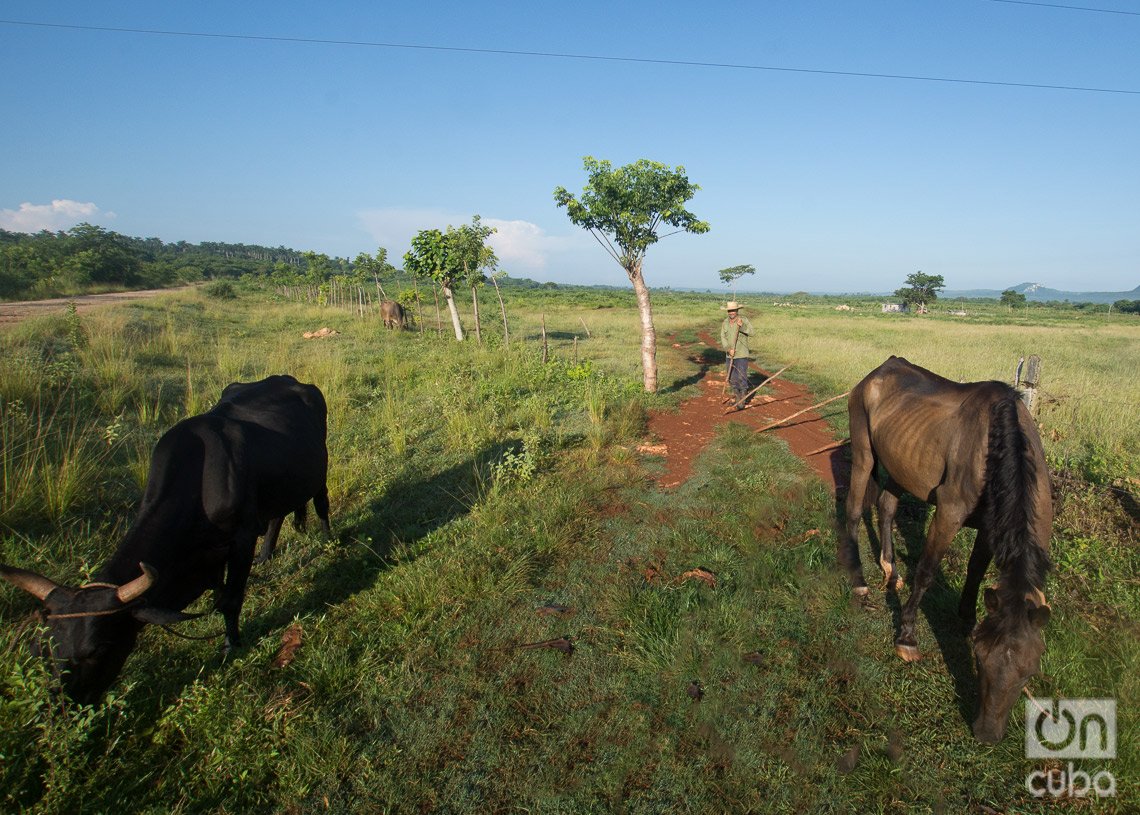
Too many things to resolve: pending regulatory frameworks and slow speed
Unfortunately, it seems that we are the envoys of the god Viracocha and we are then the owners of time. In the conditions that the country has gone through in the last four or five years, with a pandemic, with the blockade, with all this, time is essential. It is, I would say, the most critical and most essential variable. I think I once wrote one of the articles in OnCuba about that. Obviously, it cannot be ignored that, as you said, this is a complicated matter, very complicated. So, the regulations, well, some have to be agreed upon and there are many interests involved.
In the frameworks of institutional economics, we would say that we must logically return to that regulatory framework, that we must achieve the rules of the game, that they be coherent, but there are many elements that influence the institutional framework. From the legal system, the political system, traditions, culture, sectoral and individual interests. There everything is together at the same time. And then achieving coordination and consensus is often difficult. For me, at least for me personally, I have the perception that many times a part of those measures or of those policies or those regulations are mediated by sectoral interests that prevent much faster progress.
I’m going to give you an example. I listed — I did my homework — I listed more than 43 aspects on which Prime Minister Marrero indicated that we had to work. One of them again is the issue of the handing over of land. And in a country that has a very large food deficit and where food products have an important weight in the increase in inflation, it is the segment that weighs the most in the increase in inflation, the delay in the handing over of land and not having sufficient regulations and incentives for those who are given the land to produce it quickly is a serious problem. Without a doubt.
The missing incentives
We see again the land issue, which is constantly repeated. Who can solve that? I imagine that it is the institution that has to do with the regulation of land in Cuba.
And that is what is responsible for the production of agricultural foods. But we again repeat the same problem that the reform has had in Cuba since the 1990s: it has to be coherent with the issue of land. There isn’t another option. And if what you want is to increase production, then the regulations have to really encourage and generate incentives so that the actors feel encouraged.
It seems to me, for example, that having eliminated the tax section exemption year for MSMEs does not really contribute to the increase of small and medium-sized businesses and state actors. And not because they are small and medium-sized private enterprises, but because there is a fact that is true and is perfectly demonstrable: the richness of the business fabric of an economy allows it to be more efficient and more flexible. In other words, the diversity and size of this fabric in terms of wealth allows the economy to have much more flexibility when boosting certain programs.
La necesaria destrucción creativa del modelo agrícola cubano
MSMEs to revitalize the economy
Definitely, MSMEs today have shown that they have a space in the national economy that is very difficult for the state business system to occupy at this time. And therefore they should be, if they are well regulated and if there are sufficient incentives, a factor that boosts the national economy.
Among the measures and tasks that the prime minister announced in his speech there is a group of them that in some way aim to ensure that these MSMEs can have an even greater space and that they can contribute more and be even more dynamic. I’ll give you an example: decentralizing approval to the municipalities can be a magnificent measure to the extent that the municipalities have the capacity to do so. And as long as they understand that having more businesses is better for the municipality. Even those that do not actually contribute directly to the development strategy. Because no one knows later how they are going to contribute.
The economy does not work with watertight compartments, but rather with communicating vessels. And what apparently does not contribute to the strategy now, does contribute later because it complements, because it produces something, because it manages to be a little piece of a productive chain.
Another measure is to achieve business and joint ventures between private enterprises or cooperatives that have sufficient assets and state enterprises. That seems fantastic to me. We said it for a long time. Why do joint ventures only have to be with foreigners? Why can’t national actors be used? What’s wrong with a national actor, a national SME in the case of foreign enterprises? Are foreign enterprises better or more socialist than the national actor? Who is finally here?
Thus I think those things can contribute. I say that they can contribute because a lot depends on the fine print.
Para “actualizar” las pymes en Cuba: 7 preguntas que debemos hacernos
Thick strokes or a well-defined program?
I have no evidence that everything is already planned, that already established, discussed, agreed upon programs have already been built. I don’t have that evidence. I can’t tell you now. It would be very irresponsible of me it say it. What I can tell you is that there are 43.… I listed 43 measures in that speech. That’s a huge amount of work.
A huge amount of work that needs to be done. I don’t know if it’s done. There are things that seem not to be coherent because one of the factors that has caused inflation to reduce its dynamics and slowdown is exactly the increase in supply. And an important part of this increase in supply has been made by MSMEs that import and market at very high prices.
Yes, it is true, at very high prices and some actually have more than extraordinary profits. I agree that this must be regulated. But I think it is a mistake to assume that MSMEs are the cause of inflation.
It is proven by academia, by science. Furthermore, since we are in a government that is based on science and innovation, it has been proven that it is not the factor that generated inflation in Cuba. There are others that have to do with errors committed by monetary policy in Cuba, without a doubt. Also due to structural deformations that we have been dragging along for a long time and have not been eliminated.
The entry of MSMEs and non-agricultural cooperatives…. (I don’t like to call them agricultural cooperatives. I prefer to call them industrial and service cooperatives. And not agricultural, because it is a term that defines it in the negative.) This has made that grid of actors that we have in Cuba more diverse, really, and diversity is good.
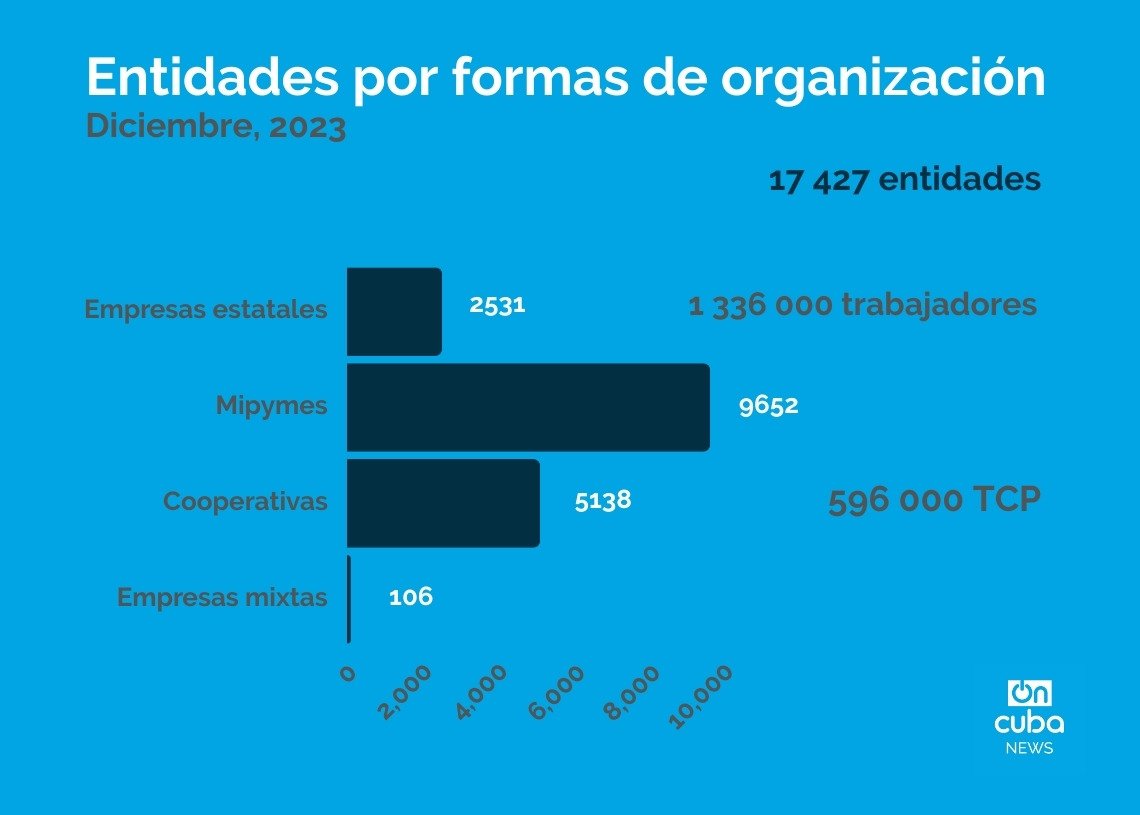
What happens is that many times we are not designed to be able to understand and manage that diversity as it should be done. It is also a process, I would say, of learning. They are not the same instruments that must be used for the state enterprise. In fact, the controls that must be carried out in a private enterprise are the same as those carried out in a state enterprise. Because it’s different. The owner of a state enterprise is the people of Cuba. And that owner is represented by the State. That’s where everyone’s money is. That man’s money is in a private enterprise. So, there you have to control other things, without a doubt.
And obviously, commerce also has its sore spots. But not only private commerce. State commerce too.
We have lived 62 years of state commerce and we know perfectly well what the sore spots of that state commerce are. From the smallest and the largest. We have the experience of those large chain stores that exist in Cuba, whose level of efficiency is far below what it should be. And they are enterprises that use the people’s money.
De la bodega estatal al bodegón mipyme: el nuevo comercio interior en Cuba
The price levels of these enterprises for some products triple and quadruple their cost in Mariel, including freight.
So, we come from that tradition. Obviously, there are other actors at play today. But what is striking is that for some of these products today the prices of these enterprises compete with the prices that those products may have in a store selling in freely convertible currency. And there is a simple reason for this. And the thing is that inflation at an international level is the same for everyone.
The minister of economy put up a table where he exemplified how the acquisition costs of a group of essential products had doubled, including powdered milk. And it has doubled. Well, that doubles for everyone. Including non-state actors. And it also doubles for state enterprises that have seen their import capacity reduced.
That’s good, right? If state enterprises cannot continue importing, unfortunately. There is an enterprise that can import and that can sell at a different price, yes. But there is a segment of the population in Cuba that can buy at that price. Therefore, it unloads the pressure on that other good that has to be delivered in a subsidized manner by the ration card to the population. So, that diversity must be taken advantage of. I would say, we should not attack that diversity. It has to be taken advantage of it and led intelligently.
Raw materials, yes
What else did the prime minister say? Well, the tariffs on those raw materials are going to be reduced or removed for enterprises that import raw materials. Well, very good. That’s a real incentive that works.
You import raw materials to produce a product through a national enterprise. For example, you import feed to produce pork and then I will remove the tariff. Don’t pay me the tariff. I would do more than that. Don’t pay me the tariff and I will reduce the taxes on the sale of those products.
For what? To encourage it because Cuba needs that. Because the country needs it. So, that diversity is logically a wealth today. Today it is a factor in favor, not against. Unfortunately, the balance that I saw in the Assembly was exactly that this diversity was a factor against our purposes of improving the economy and continuing to try to achieve that vision of the country that we have.
And this is demonstrated to me by the fact that the president of the republic himself in his final speech reaffirmed again, as did the prime minister, that this was not an offensive against MSMEs.
2024 financial policy and budget
The deficit increases because expenses increase and because income is not enough to cover those expenses. It must always be said that the expenses in Cuba and the budget in Cuba are very compromised because an important part of that budget, I would say a decisive part of that budget, goes to sectors that have been the pillars of the country’s social policy: education, health, culture. Then you have to look for other ways to reduce income.
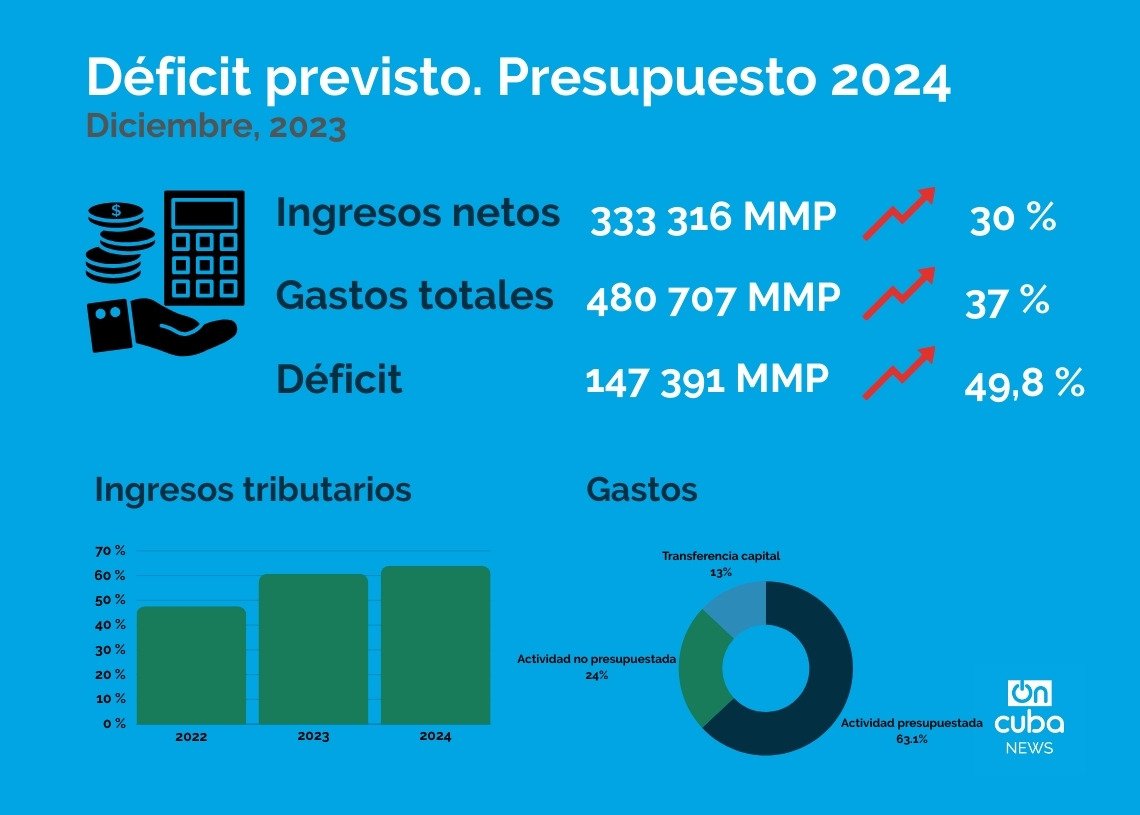
I am convinced that even in these sectors we can be much more efficient in the use of expenses and a part of the expenses could be reduced without affecting teachers and doctors and even increasing the salaries of teachers and doctors. It is one of the things that definitely has to be done.
Potential to reduce expenses
Obviously there are many things to do in Cuba in terms of reducing expenses. First, unify ministries and reduce devices and buildings that are used for those offices. I am against that.
There are magnificent people in the ministries, let it be clear. This has been talked about systematically. There is also a possibility of reduction there. There cannot be 1,600,000 workers in the budgeted sector of the economy (51%) and 1,400,000 (49%) in the business sector. Because that is a total distortion, it is a destructuring. There should be many more in the business sector. Che’s definition is underdevelopment: a dwarf with a giant head and torso and small feet. Well, that’s what’s happening to us. We have weak legs and a gigantic torso and head and that, logically, makes any movement difficult.
It unbalances it. So that has to be reduced. But that was already done in the early 1990s. One of the first measures that Fidel took was to reduce the number of ministries that existed in Cuba.
And they were reduced from 56 to 25. And also reduce the staff of those ministries. A commission worked on it and these expenses were reduced considerably. Well, we have to do the same now. Why? Because the country is not in a position to support this giant superstructure that weighs too much. And that hinders the processes. It is something that is recognized in the speeches of the minister of economy, the prime minister, the president.
Create more jobs
We must open the economy more and encourage the creation of new enterprises, activities, and non-state actors. Four thousand new actors are planned for this year. We must encourage that they be more.
We must open the economy more to have more foreign investment in the country. Without a doubt.
This year it was already announced that 2023 would end with the largest number of foreign enterprises that had ever signed in Cuba. They were signed this year. There are intentions for a significant amount that is not enough. And among other things it is not enough because Cuba’s economy is not a very attractive economy. Whoever invests in Cuba takes many risks: economic, credit and financial, even political risks, which have to do with the persecution that the U.S. authorities carry out against the enterprises that are in Cuba. So we have to improve, facilitate and streamline that process.
It cannot be that a business takes seven months to be approved and that all the ministries have their hand in the business. It just can’t be like that.
Fiscal deficit and excess liquidity
A part of that personnel that is already evident that it is floating, instead of leaving them in those structures, we have to do as was done in the 1990s. They are given a subsidy for a group of months so that they can adapt to these new conditions and that’s how it’s done. We already had that experience. To some extent we are worse off than in the 1990s. Is it painful? Yes, it is very painful. But more painful is continuing to drag a fiscal deficit that is procyclical and that ultimately affects all groups.
The deficit is not procyclical per se, it depends on whether you solve it by monetizing. By monetizing you put money into circulation. You withdraw money in conditions of very low supply and with very little response capacity from the productive sector to generate production and convert it into supply. So, that goes where? That goes to inflation. And it is proven by science that one of the main causes of inflation in Cuba is the excess liquidity that the monetization of the deficit has caused. So when you monetize the deficit, you turn it into a procyclical phenomenon. It has an impact on inflation. Inflation raises prices and devalues the national currency.
It directly affects the purchasing power of families’ income. And then it not only becomes a procyclical measure but it becomes a regressive measure because it affects those most affected. And the proof is that the largest percentage in the structure of inflation is in the increase in the price of food products. Because people can stop doing anything, but they can’t stop eating. So in the end you have to pay for the food at whatever the price to the extent that you have income.

Stop the inflationary spiral
It’s not going to stop in a year. That’s impossible. The distortion is so great that anyone who said that in a year this will be resolved would be very irresponsible. Among other things, because of all the factors in between. That are not only monetary, but also have a productive structure. So it would be very, I repeat, very irresponsible to say that it is possible to stop this in one year.
First, it is not a single measure. It will have to be a program, a group of measures. The macroeconomic stabilization program has been talked about repeatedly since last year. Unfortunately, there was not enough progress in that program, nor in the depth to which we must advance in that program. Because this program has social costs, it has political costs.
And we must try to reduce those costs to a minimum, but they do exist. The distortion that has been maintained for so long in Cuba, because we are talking about this one now, but this is a distortion that has been going on for a long time. And then, that accumulated distortion, well, you have to pay for it. There are costs that have to be paid. And the problem is how to distribute these costs so that the social and political costs are as few as possible. That’s where the challenge is. There is no way it can be distributed any other way.
It is not because of a book issue, nor what the books say, it is the reality of the national economy today. Unfortunately, we have been extremely innovative with these monetary issues, looking for a single currency and we ended up having four. Looking for a single exchange rate, we have had three. It’s tragicomic.
What’s most interesting is that at least based on science it is known that a group of measures that have to do with reducing spending must be achieved; with the best allocation of resources to the sectors that can generate products and supplies in the shortest term; with the increase in supply; with the generation of new jobs; in addition to monetary measures — exchange rate and exchange rate regimen; with restoring the trust of the banks, of the people and of the public in the banks. Which is very difficult after what has happened, not only with the bancarization, but even before, with the Reorganization itself.

Restore trust
There are people whose money was diluted, it became water and salt at a certain moment. Trust is essential: money is trust written on paper. It is nothing more than that. And the banks, which are the ones who support it, have to be the institutions where there is more trust.
Today, unfortunately, a part of the population in Cuba does not have that trust.
The Cuban banking system has to play a much more important role than it has played and requires autonomy, without a doubt, to be able to do things that banks necessarily have to do. Among others, put discipline in the monetary issue. It can’t be any other way.
The minister of finance announced that from now on the degrees of approval of expenses and distribution of some overcompliances and income will no longer be in the hands of the Ministry of Economy and will pass to another authority, the Council of Ministers. That’s good. Because you have to somehow later set rules with these things.
State business sector
We must clean up the state business sector. Many enterprises still have losses and/or very low profitability. In short, the business sector, the state, is the most important thing we have today. The most important. And all over the world those big enterprises are the ones who decide the game. Today we may have a million, a million and a half workers in the non-state sector, but we have a million or so in the state sector in enterprises that if they become more dynamic and if we find the incentives to make them more dynamic, logically they will change the situation. And they even become enterprises that attract the rest of the non-state actors.
SMEs provide more than 90% of employment in many countries, but they barely provide 10-12% of exports. And it is like that. It is very easy to create an SME and it is very easy for it to fail and disappear, but the costs associated with that poor execution are minimal compared to the costs associated with poor execution of a large state-owned enterprise. Therefore, the impact on society and the economy is minor. And then makes it possible to adjust.
That’s why I say that SMEs provide the flexibility that large state enterprises cannot provide. Not because I don’t want to, but because it is another structure, definitely. And that’s how the world is made up. It’s not just in Cuba. Large enterprises are less dynamic, less flexible than small and medium-sized enterprises.
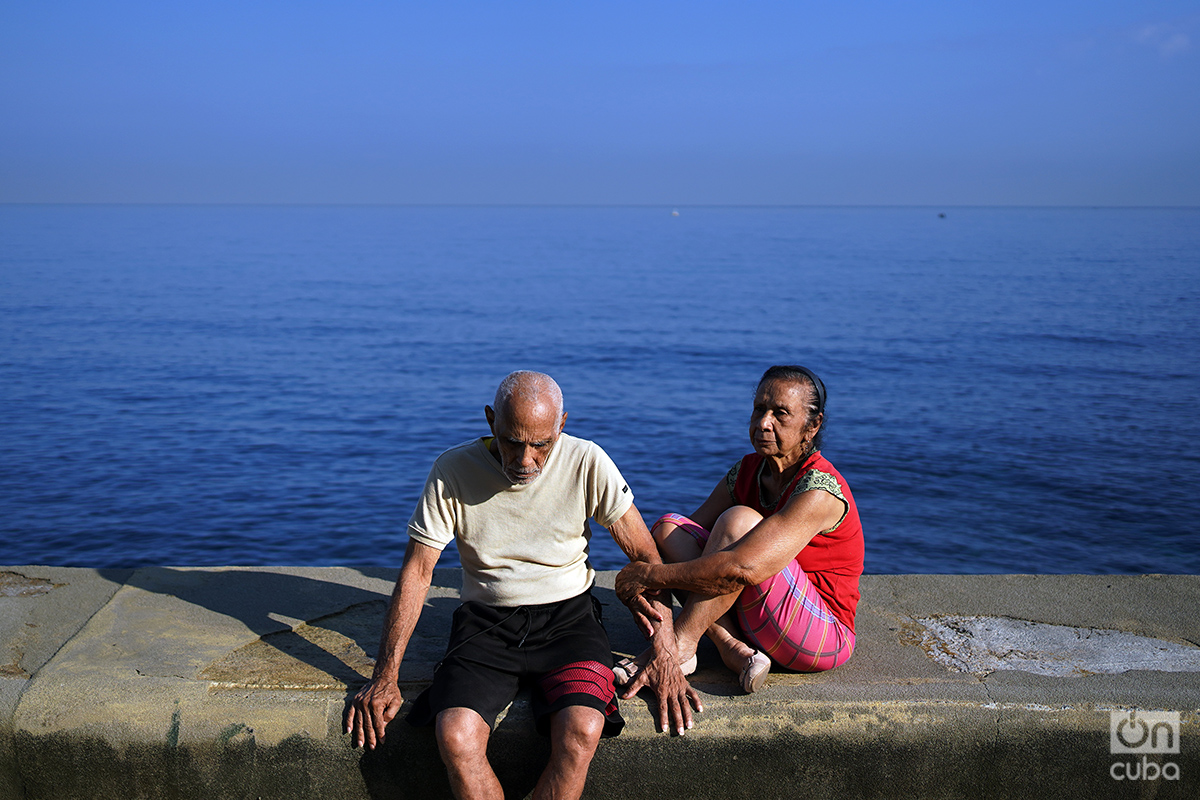
Pessimism/Optimism
By definition, by genetics, I am an optimist. To be an economist and dedicate yourself to development issues you have to be an optimist. There is no other option. Not only looking at Cuba, but looking at the world. So, yes, because of genetics I am an optimist.
Also because in these last two years, of all the work and all the not pleasant things that may have happened, pleasant things have actually happened. It is a demonstration of how much more potential and resources there are in the country to make small and medium-sized businesses grow. It was demonstrated starting in 2021, when the first one was approved. Since then many things have changed in Cuba and, in fact, they have played a role. And that really gives me optimism.
Let’s hope everyone thought about it that way and that in some way the idea remains of, not only of the need, but of how much small and medium-sized enterprises, fundamentally private, because they are the majority, can contribute if they are guaranteed an environment of suitable business.
I’m also optimistic because this year more than, more than 40 deals were signed with foreign investment, despite the conditions that Cuba is in and the fact that a very large magnifying glass, a very large microscope, of the U.S. Office of Foreign Assets Control will always be on these enterprises, therefore it is very risky. And even though they are going to have a hard time finding correspondent banks willing to carry out their operations. I mean, all that, and well, they are there. And even though, from the Cuban side, and this is perfectly public, there is a debt with suppliers, there is withholding of dividends, which do not contribute at all to that good business environment that must exist.

Coherence, consistency, sequentiality
We have to ensure that our measures, our transformation, our reform, whatever we want to call it, are sufficiently coherent, consistent, that they have the appropriate sequence when implementing them. Those three things are basic.
That is what the reform has suffered from: it has not been sufficiently coherent or consistent. And many times, as happened with the Reorganization, the sequence was totally wrong. So, learning from that, which is very recent, we can really project a lot into the future.
I don’t believe that this year we can think that we are going to have a seismic change for the better. Unless resources suddenly appear. Someone who lends 3 billion or 4 billion. (But hey, the Soviet Union disappeared many years ago.) It’s very difficult for it to come back.
A lot of money is required to undertake such a large program in a very short term or to directly impact what the population suffers the most, which is the supply of food, the lack of transportation. They are, I believe, the two things that hit the Cuban population the most. So, it won’t be immediately.
“What if I ask you to describe how 2024 will be like?”
“It’s going to be really tough.”









